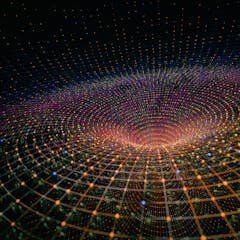
Articles on Physics
Displaying 141 - 160 of 457 articles

The largest orbital telescope ever made will allow astronomers to study the atmospheres of alien planets, learn about how stars form in the Milky Way and peer into the farthest reaches of the universe.

Preprints are scientific papers made available before being published in a peer-reviewed journal. The Australian Research Council has banned researchers from citing them in grant applications.

A US laboratory has announced an exciting new leap forward in nuclear fusion, but it may be several decades before we see this form of energy come to fruition.

In trials teaching Einsteinian physics in schools, our most astonishing discovery was that children were not astonished: they just took the ideas in their stride.

The universe has a finite age — 13.8 billion years to be exact. So if it had a beginning, why is it so difficult to say for sure whether it will have an end?

Without a magnetic field, the Moon’s surface is exposed to solar wind. These could have been depositing resources like water and potential rocket fuel on the Moon’s surface for billions of years.

Excluding, silencing and discouraging so many brilliant minds carries a very heavy cost, not just to the women directly impacted, but to all of humanity.

Gravity is something every person on Earth intuitively understands: It is what keeps you on the ground. But how come gravity pulls down, rather than pushes up? Einstein came up with the answer.

Olympic surfers are coming from around the world to compete in surfing’s Olympic debut. But where will the waves come from?

Science teaches you many skills. Even if you don’t plan for a science related career, including a science subject in your senior years can provide a good balance. But only if you’re interested.

The reason bigger objects in space are round and smaller ones aren’t boils down to gravity. And it’s the same reason mountains on Earth can only grow to a certain height

More than a century after publishing major papers in theoretical mathematics, German-born Emmy Noether continues to challenge and inspire mathematicians with her story and mathematical legacy.

The English astronomer and navigator Thomas Harriot died in 1621, leaving behind 8,000 pages of notes containing a trove of unpublished scientific discoveries.

‘Reality, including ourselves, is nothing but a thin and fragile veil’: a new interpretation of quantum physics says objects have no independent existence.

Riders in the 2021 Tour de France will ride more than 2,100 miles (3,400 km) over the 21 flat and mountainous stages of the race. And they will burn an incredible amount of energy while doing so.

Pitchers in Major League Baseball have been striking out more batters than ever, and some people say it’s because they’re adding sticky stuff to the balls.

Quantum microscopes reveal biological structures that would otherwise be impossible to see.

Fast radio bursts are the focus of a young and fascinating field of astronomy. Researchers just released data on more than 500 new bursts, quadrupling the total number of detected events.

This is the first time a measurement has been made of the entropy generated by telling time.

If emissions continue at their current pace, Antarctica will cross a threshold into runaway sea rise when today’s kids are raising families. Pulling CO2 out of the air later won’t stop the ice loss.
